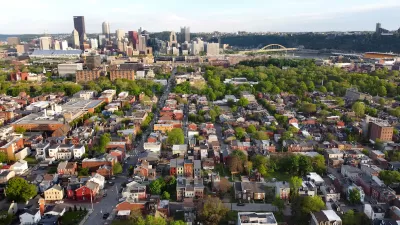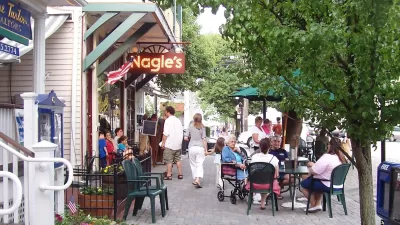To paraphrase B.F. Skinner, if you want positive behavior, either reward it in return, or remove something unpleasant in response; to paraphrase R. Steuteville's commentary, if we want a green economy, we need to do the same thing with development.
"Many new urban projects are built successfully with no public subsidies. But without incentives, the transformation to smart growth takes place much too slowly. Green technologies require a helping hand to compete in the mass market. Industry is heavily invested in current methods, and transition costs are high. Comfort with the status quo and fear of the unknown are barriers to change.
"Smart growth is the green technology of the real estate development industry. Consumers are most familiar with houses on automobile-dependent one-acre lots. One way to encourage more people to try something new is to build a really high-quality public realm loaded with parks and amenities, as planned in Verano [a large green development project SW of San Antonio, TX, supported by tax-increment financing]. This approach costs money. Today's smart growth is not your great grandfather's urban neighborhood - where they laid down a basic grid of streets and let the builders do the rest.
"In most municipalities, builders are strongly discouraged from creating anything but automobile-dependent suburbs. Zoning generally requires dumb growth, and developers are forced either to build sprawl or plead for permission to do something better. Where Verano is planned, officials got rid of that disincentive by approving e SmartCode. The new zoning is, like the TIF, appealing to the developer because as long as the plan meets the SmartCode, public approvals are streamlined.
"Do we want a green America that spends less of our national treasure propping up dictators? We can move in that direction by removing regulatory incentives for sprawl and adopting tax incentives for green development. The development industry will respond with smarter plans that offer residents transportation choice."
Thanks to The Intrepid Staff
FULL STORY: For a green economy, create incentives for smart growth

Planetizen Federal Action Tracker
A weekly monitor of how Trump’s orders and actions are impacting planners and planning in America.

Maui's Vacation Rental Debate Turns Ugly
Verbal attacks, misinformation campaigns and fistfights plague a high-stakes debate to convert thousands of vacation rentals into long-term housing.

San Francisco Suspends Traffic Calming Amidst Record Deaths
Citing “a challenging fiscal landscape,” the city will cease the program on the heels of 42 traffic deaths, including 24 pedestrians.

Amtrak Rolls Out New Orleans to Alabama “Mardi Gras” Train
The new service will operate morning and evening departures between Mobile and New Orleans.

The Subversive Car-Free Guide to Trump's Great American Road Trip
Car-free ways to access Chicagoland’s best tourist attractions.

San Antonio and Austin are Fusing Into one Massive Megaregion
The region spanning the two central Texas cities is growing fast, posing challenges for local infrastructure and water supplies.
Urban Design for Planners 1: Software Tools
This six-course series explores essential urban design concepts using open source software and equips planners with the tools they need to participate fully in the urban design process.
Planning for Universal Design
Learn the tools for implementing Universal Design in planning regulations.
Heyer Gruel & Associates PA
JM Goldson LLC
Custer County Colorado
City of Camden Redevelopment Agency
City of Astoria
Transportation Research & Education Center (TREC) at Portland State University
Jefferson Parish Government
Camden Redevelopment Agency
City of Claremont





























